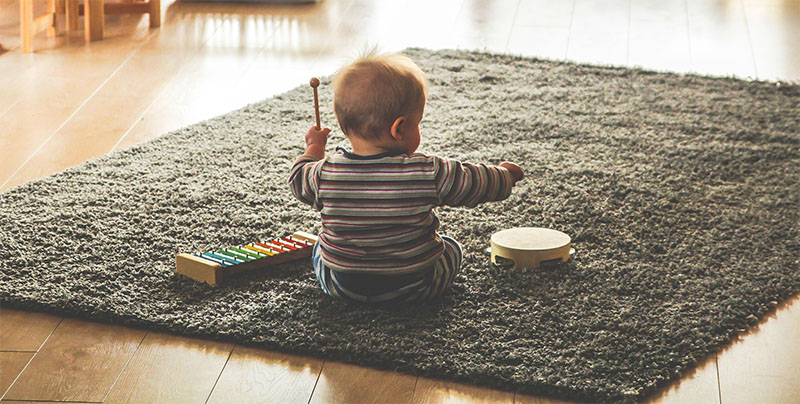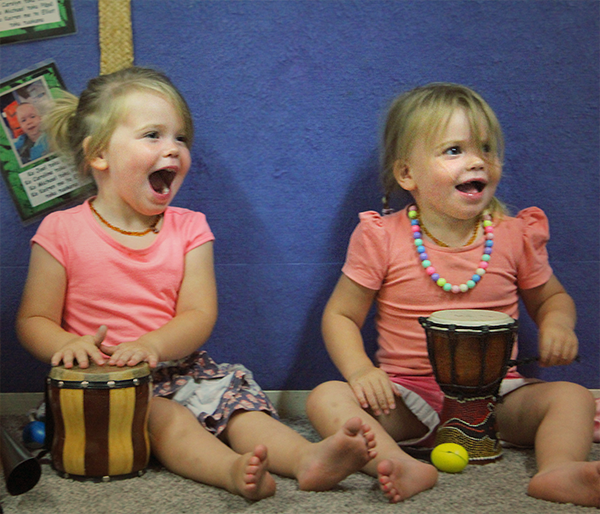Medical science has revealed that the brain of a child develops at an incredible rate during the preschool years. In the first months of a baby’s life, many more neural pathways are laid down than any person will need during their life span. Pathways that remain unstimulated lose functionality; musical exposure ensures the survival of some of these which have many benefits as the child grows. Early experiences in the life of a child can have life-long consequences as these experiences (whether they are positive or negative) have the capability of altering both the structure and the function of the brain. This early period has been identified as an optimal time for learning.
The effect of exposure to music on the developing brain is multi-modal –
Music is:
- visual
- auditory
- emotional
- develops memory and motor skills
- consolidates both hemispheres of the brain
- plays a vital role in neurological development

Socialisation
The relationship between carer and infant is essential to the social and emotional development of the child – all other learning is dependent upon the child forming a secure attachment with at least one significant adult. As a child develops they must learn to accept and control a myriad of feelings that arise in daily life both at home and outside the home.
Music classes:
- strengthens the parent-child bond and scaffolds parents who are unconfident singers
- provides support for socialisation through a fun structure
- allows for a child to explore and express emotions
- develops self control and confidence
- improves concentration
- helps to acquire skills in social interaction and collaboration in a non-threatening environment

Literacy
Music, most especially song:
- provides an unrivalled way for a baby to learn to identify the tones that make up spoken language
- facilitates the development of vocabulary, whether the child is acquiring a first or second language
- singing enhances memorisation by creating opportunities for rehearsing words and phrases
- some researchers suggest that perception of rhythm and pitch impacts learning to read and spell successfully
- immersion in a musical programme of learning benefits a child not only at the immediate time, but also for many years to follow
Mathematics
Music and maths both have underlying characteristics of ratios, regularity and patterns
- research has indicated a correlation between high achievement in maths and music
- children who can recognise and create patterns in music are well equipped to understand mathematical patterns
- the part of the brain that controls the fingers also is associated with counting
- the use of songs with actions using fingers facilitates mathematical development
- music is comprised of a pulse which measures time, and rhythm is required to be contained within a specified number of beats
- rhythm games involving doubling and halving addresses the mathematical concepts of fractions and time
- participation in these activities contributes towards a greater mathematical understanding
Movement
- children react to music in a physical way – they have music in their bones.
- dance and music are so closely entwined that some cultures have only one word for both
- music offers the developing child the opportunity to support both gross and fine motor control
Gross motor control
- is the ability to make large, general movements and is dependent upon the coordination of bones, muscles and nerves
- rhythmic sense is strengthened through using the body’s own weight and large muscle groups, leaving a more powerful, intense impression on the kinaesthetic memory
Fine motor control
- is the coordination of muscles, bones, and nerves to produce small, precise movements which are essential skills for learning to write
- finger play games and action songs initially assist this development
- playing musical instruments refines this further as the child has to learn the best way to hold each instrument in order to achieve the best sound
- this control becomes more precise once the child begins to work with rhythm and pulse or finding specific notes on a tuned instrument.
Bibliography
Baney, Cynthia E. (1999). Wired for Sound: The Essential Connection Between Music and Development. Early Childhood News
Flohr, J. W., & Persellin, D. C. (2011). Applying Brain Research to Children’s Musical Experiences. Learning from Young Children: Research in Early Childhood Music, 3.
Harris, M. (2009). Music and the young mind: Enhancing brain development and engaging learning. R&l Education.
Pound, L., & Harrison, C. (2002). Supporting musical development in the early years. Open University Press.
Young, S. (2009). Music 3–5. Taylor and Francis Inc.


